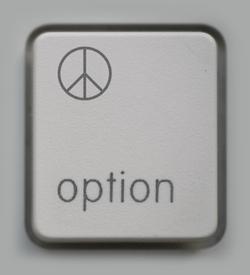MomenTech

The Routledge Publishers promotional text for Chris Hables Gray's 2005 book Peace, War, and Computers asserts: "Computers are at the heart of war today: the U.S. Navy relies on Palm Pilots as much as fighter pilots. American cybersaboteurs unleashed computer viruses against Slobodon Milosevic in Yugoslavia. Even Marxist guerrillas in Colombia reported that the computers they used to track kidnappings were Y2K compliant. A visionary and disarming overview of cyberwar in the 21st century."
But computers are merely tools, certainly more amoral than guns (which are designed only to kill). And while computers have become increasingly central to military operations, they have also played a larger role in peace-building, the expansion of democratic ideas, and the spread of humanitarian aid and social welfare. Computers, as access points to the Web, have also demonstrated their efficacy in the toppling of dictators. The role of social media outlets like Twitter and Facebook in last year's Arab Spring are a clear testament to this fact.
Like the fictional Magneto of the X-Men series, the Peace Option Key isn't real. However, unlike the comic book villain, it offers the alternate view: Peace is an option. And as we exist increasingly within a computerized world, having a Peace Option Key illustrates not only the possibility that peace is within our reach (i.e., it is literally right in front of us), but also that the globalism that the internet engenders can—and should—be used a tool to achieve a global peace.
http://momentech.blogspot.com/